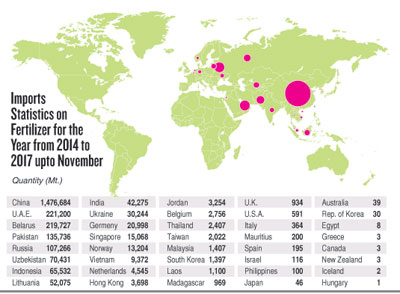News
Fertiliser crisis: Issue with Pakistan averted
Hot on the heels ofa spat over a tea ban by Russia, the fertiliser shortage which the Government blamed entirely on a Pakistani policy to “ban” exports nearly became a diplomatic issue between the two countries, with Sri Lankan diplomatic sources claiming that Pakistan wanted to clarify its position but decided against it due to “political sensitivities,” the Sunday Times learns.
The suspension of urea exports by Pakistan was by no means “unexpected” or “sudden”, trade sources from that country said. It is widely known that, during the final quarter of every year, there is a three-month export freeze to ensure that sufficient fertiliser is available domestically during the wheat cultivation period.

Farmers queueing up to buy fertiliser at Rajanganaya. Pic by Karuwalagaswewa Jayaratne Wickramaarachchi
This is outlined in Pakistan’s national fertiliser policy and was known to the Sri Lankan industry, including Agriculture Ministry officials. The policy holds that all fertiliser exports must be completed before October 31 each year; Pakistani suppliers are not permitted to send any urea out after that date. But the freeze somehow affected several Sri Lankan private sector companies which had placed orders for 40,000 metric tonnes of urea through traders in Singapore. The orders were made at the end of August, for the supplies to arrive well before the October 31 deadlines. The sailing time from Pakistan to Sri Lanka is less than a week.
Ironically, 2017 is the first year in recent times that Sri Lanka has even ordered urea from Pakistan. Data obtained from the Department of Customs for the period from 2014 to 2017 show that imports from a host of countries including China (the largest quantities) and Australia, Hungary and the Philippines (the smallest quantities). However, the first imports from Pakistan– 135,736MT–arrived last year.
Industry sources said companies had turned to Pakistan because world market prices, particularly those of Chinese suppliers, had risen by US$125 a metric tonne. Pakistani suppliers were selling for US$ 100. Despite the orders being lodged in time, the shipments were affected by the freeze. One Sri Lankan company had sought 20,000MT but only 7,000MT were forthcoming. The industry is now trying to sue Singaporean traders for breach of contract. This had nothing to do with Pakistan but with the arrangement between the traders and companies.
As the crisis escalated in Sri Lanka, daily television footage of protesting farmers brought upon the Government much negative publicity. The Agriculture Ministry then tried procuring urea in the spot market, while blaming the shortage on the Pakistani “ban” on fertiliser exports.
The Sri Lankan Government used diplomatic avenues to request the Pakistani Government to let the urea through. It was learnt that a country-specific relaxation of the freeze was complex, though not altogether impossible if the matter was taken up at Heads of Government level.
This prompted President Maithripala Sirisena to telephone Pakistan’s Prime Minister Shahid Khaqan Abbasi. The latter convened the Economic Coordination Committee–a body representing the country’s four provinces at ministerial level–because it had the power to lift the restriction. On the basis of friendship, a consignment of 75,000MT of fertiliser was approved. A ship with 40,000MT of fertiliser was due to arrive on Thursday.
 The local industry points out that the Government’s mishandling of its own urea purchases compounded the situation. In October, the Agriculture Ministry submitted a Cabinet paper for the direct procurement of 100,000 MT of prilled urea for the Yala season. The attempted spot purchase (brought on by Pakistan’s urea freeze) was more than double the quantity of the previous purchases for Yala.
The local industry points out that the Government’s mishandling of its own urea purchases compounded the situation. In October, the Agriculture Ministry submitted a Cabinet paper for the direct procurement of 100,000 MT of prilled urea for the Yala season. The attempted spot purchase (brought on by Pakistan’s urea freeze) was more than double the quantity of the previous purchases for Yala.
But the product was to be bought from a first-time supplier not registered with the Ministry on DA (documents against acceptance) terms, outside of the usual letters of credit (L/C) terms. This direct purchase was blocked through industry protests–highlighting the need for open tenders–to President Sirisena.
A tender was then called in November for 72,000MT of prilled urea on DA terms. Of five bids, only one was on DA terms. Again, it was from a non-prequalified, unregistered, first-time supplier JAT Holdings and higher than all the others. This was accepted but subsequently cancelled because the company could not meet the required specifications. It caused a procurement delay that added on to the situation with Pakistani urea imports.
Meanwhile, private sector companies have also now placed orders with China for the more expensive urea. These will be issued in limited quantities as they cannot meet the price ceiling of Rs 2,500 for a 50kg bag.

